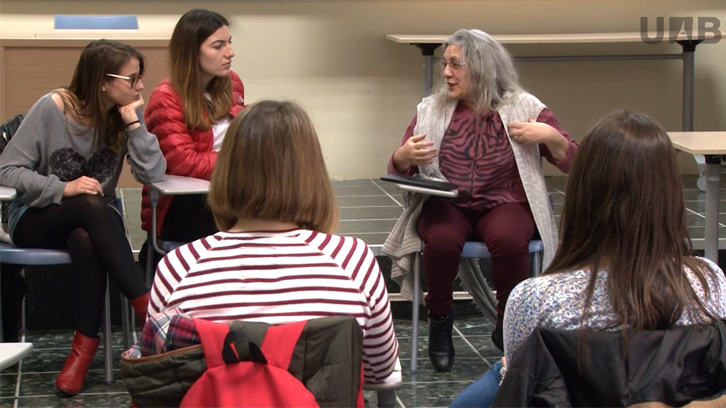Expert patients as teachers in the degree in Nursing: health as a shared responsibility

During the 2017/2018 academic year, in the Module of Nursing and Medical Anthropology of the bachelor’s degree in Nursing at the UAB, workshops designed together with HIV patients were carried out to bring the students closer to the reality of people affected by the disease. The nurses in training re-discovered a humanization of care and acquired a critical and reflective look at their care practice.
The path towards the humanisation of healthcare requires that health workers begin to link theory and practice right from their training when they are students. The curricular content is important, but it is equally important the perspective of the patient as a person with knowledge and a voice of their own, as a subject responsible for their health, and not only as an object of care.
There are different initiatives in which patients have been invited to participate in the training of healthcare professionals. This study differs from those previous experiences in that it has been co-designed with the patients, who have also taken on the role of teachers in the activity: defining, teaching, and evaluating all the content. A series of 5 workshops addressed different aspects of HIV: diagnosis, how to disclose to family members, treatment, the stigma associated with the disease, and the relationship with gender, justice, and equality. Each session was led by the expert patients, women living with HIV: it started from a previous reading of specific articles to familiarise the students with the topics to be addressed. From that, they led group discussions in which they contributed with their personal experiences. This is one of the rare initiatives that include patients in a teaching role.
The expert patient workshops allowed the students to approach the reality of people affected by HIV from all areas: biological, social, cultural, and emotional. They understood the health-disease continuum, and what it means for the patient to live and manage their disease. As future professionals, they integrated the importance of humanising healthcare and using a more patient-centered model of care. In addition, on an individual level, the students reported having improved at a personal level and having acquired a critical view of their attitudes as well as a reflective and changing view of their care practice. They re-discovered a humanisation of care centered on an expressive dimension in which compassion, trust, and communication played a crucial role.
When the patient is no longer in a bed but away from that 'patient' position, student nurses can see the possibilities of that person as an 'agent' of their health. By deconstructing the patient's role and resituating them in a role of power, in this case as a teacher, their voice and experiences are heard as subjects to learn from. In the classroom, students learn from the patient; in clinical practice, students learn about the patient. In this sense, humanisation of care involves revindicating their condition as active agents of their own health.
Nursing Department, Facultat de Medicina. Universitat Autònoma de Barcelona (UAB)
Grup de Recerca Multidisciplinar en Salut i Societat (GREMSAS), (2017 SGR 917).
References
Feijoo-Cid M, García-Sierra R, García García R, Ponce Luz H, Fernández-Cano MI, Portell M. Transformative learning experience among nursing students with patients acting as teachers: Mixed methods, non-randomized, single-arm study. J Adv Nurs. 2022 Oct;78(10):3444-3456. doi: 10.1111/jan.15364 Epub 2022 Jul 16. PMID: 35841333; PMCID: PMC9540309.
Video report: https://videosdigitals.uab.cat/video/41/playVideo.html?serial=642&file=17013.mp4

